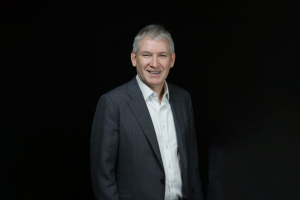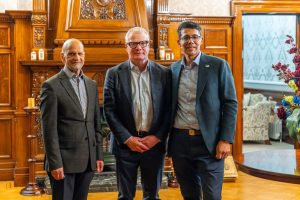SPECIAL REPORT: The Spirit of Innovation

THE spirit of innovation and enterprise has helped to drive forward the development of Birmingham for more than 200 years. Deputy Editor Duncan Tift takes a look at the new spirit that prevails in the city and why its founding fathers would be more than happy.
The successful marriage between science and entrepreneurship helped to make Birmingham one of the most prosperous cities of the British Empire.
Its manufactured goods, many of which were produced using cutting edge scientific methods, were exported around the world and created fortunes for those involved.
The seeds of that pioneering spirit were sown by the Lunar Society back in the latter part of the 18th century.
The society comprised the foremost industrialists and intellectuals of the time, including Erasmus Darwin, Matthew Boulton, James Watt, Josiah Wedgwood and others.
All recognised the importance of utilising the latest scientific methods to advance business development and the approach has been adopted by successive generations of Birmingham entrepreneurs.
Perhaps the best example of this approach currently is the pioneering work being conducted at Birmingham Science Park Aston, where the next generation of science-based entrepreneurs have found a suitable base for their ambitions.
Aiding them in their endeavours is the Entrepreneurs for the Future (e4f) programme, run by the science park and funded by Birmingham City Council and Be Birmingham through the Working Neighbourhoods Fund.
In true Lunar tradition, it encourages collaborations and knowledge transfers between universities and businesses to generate new graduate-based companies.
It also promotes investment in new high tech and high growth ventures, creates new high value jobs and enhances the CityRegion’s inward investment prospects. It also helps to retain in the area, the brightest thinkers and the best young talents.
This month’s MACH 2010 exhibition at the NEC served to highlight how the region’s traditional manufacturing industries continue to thrive by developing new products and services to meet the needs of their customers.
A similar showcase event at the BSPA while not on the same scale, helped to illustrate how e4f’s new entrepreneurs aim to carry on that tradition.
The event demonstrated the success of the first seven months of the programme and more than 20 businesses took part, each eager to show off their products and services.
PICTURE GALLERY: e4f Showcase at Birmingham Science Park Aston
Opening the event was leader of Birmingham City Council, Cllr Mike Whitby.
He said: “Birmingham’s heritage is famously founded on industrial innovation and manufacturing, and while manufacturing remains a central plank in the region’s economy, future economic success must be derived from the utilisation of knowledge, skills and innovation. It is institutions like BSPA that are needed to really fly the flag for the city and the ‘Birmingham Brand’.

The e4f programme, set up last November, originally aimed to help establish 16 new ventures in 15 months – a target that has been achieved in just six months.
“This is a great initiative to germinate and incubate the seeds of entrepreneurship, which in turn will bring further jobs, wealth and employment to our city,” added Cllr Whitby.
David Hardman MBE, managing director of BSPA, said the city had a wealth of creative talent which needed the right platform in order to deliver on its promise.
“We have a wealth of talented entrepreneurs in the city who have some fantastic ideas for start-up companies in high tech, high growth sectors such as IT, web 2.0, digital media, clean/green tech, medical technology and bio technology.
“We developed e4f to provide a holistic package of support to overcome the common issues which cause this to happen. As they emerge from incubation, BSPA offers an environment where knowledge-based businesses like these can thrive – bringing together people with ideas and technologies, people with expertise and experience, and people with funds to invest,” he said.
The new breed of entrepreneurs in Birmingham are not alone in seeing the advantages technology has to offer.
New research suggests entrepreneurs across the country are driving the adoption of new technology and social media to develop new ways of working.
According to a new study released to coincide with this month’s Entrepreneur Country Forum, 94% of entrepreneurial companies say they are using free or low-cost technology and services, while 85% of those questioned said they had adopted new ways of working to help grow during the current economic climate.
The research, which quizzed more than 500 fast-growth organisations with fewer than 100 employees, sales and marketing, IT and customer services have benefited most from new free and low cost technologies.
The most popular technologies and services being adopted are:
• LinkedIn (78%)
• Skype and other voice over IP solutions (65%)
• Freeware (61%)
• Twitter (52%)
• Software as a service applications (47%)
Julie Meyer, founder and CEO of Ariadne Capital and Entrepreneur Country, said: “Necessity is the mother invention, and entrepreneurs are inventive people. Although we live in straightened times, those building businesses in this environment are adopting new technologies, services and ways of working as a way to survive and thrive.”
Only just over half of entrepreneurial businesses take the traditional approach of renting their own office premises, with one in five now operating without an office and happy for staff to work from home or on the move.
Hotel foyers, coffee shops and private membership clubs tend to operate as meeting and working locations when required.
A further 12% are based at an office wholly owned by the company founder and 10% opt for a branded serviced office such as Avanta.
The Entrepreneur Country Forum is an event specifically for entrepreneurial companies. The theme of this year’s event – Born into a World with no Money – illustrates the way many entrepreneurs feel about the current state of the economy.
However, the tough ones are fighting back and despite the climate are using all weapons at their disposal to overcome the difficulties and thrive.
Many have recognised the importance of new technology and have readily embraced the social revolution taking place. This has enabled them to work in more effective ways, keep costs at a minimum and create a new generation of products and services.
The banking crisis and the subsequent reluctance of most banks to lend to entrepreneurs is thought to have driven a back-to-basics approach when it comes to finance.
Almost half of the companies founded in the last two years have their principal funding from the company founder, with a further 24% bank-rolled by the founder’s family or friends. Companies principally backed by an individual investor or angel investor, make up another 12%, with seed capital or venture capital firms funding a further 11%.
“Far from looking to traditional organisations like banks and institutional investors like 3i to back our new generation of wealth creators, it’s clear that in a world with no money entrepreneurs will be looking instead to the `3fs` – friends, families and founders – for the capital they need to succeed,” added Ms Meyer.
In a separate feature on Monday Duncan Tift showcases some of the firms participating in the e4f programme.









